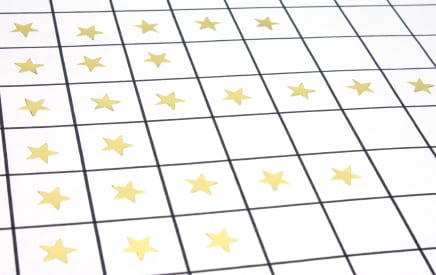 Scientists have finally confirmed what parents have long known: REWARDS WORK.
Scientists have finally confirmed what parents have long known: REWARDS WORK.
Yup. Find the right reward and you can get your kids to do pretty much anything. Even gobble up the greens. You don’t even have to resort to ice cream, cake or the other tried-and-true yummy rewards. Kids will eat their veggies in order to earn . . . stars? Yes, stars!
Want to hear something even more remarkable? Researchers have figured out that kids will voluntarily select healthy drinks to earn stars. Plain milk instead of chocolate milk? Those must be some pretty powerful stars!
The study I’m referring to is a school-based initiative called the Kid’s Choice Program, but there’s no reason you can’t use it at home. Here’s what you do:
1. Tell your kids they will earn a star every time:
- They eat their vegetables before the rest of the meal.
- They choose to drink a low-fat, low-sugar drink such as plain milk or water. (The researchers also included 100% fruit juice on their healthy drinks list.)
2. When your kids earn 10 stars, let them “buy” a little toy or some other small reward.
Here’s the only caveat: You have to make sure you serve an extremely small serving of vegetables – no bigger than a golf ball. Now, you’ve probably heard that it’s not a good idea to bribe kids into eating their peas, so I wouldn’t blame you if you were skeptical.
But this system works! Why? Because the goals are well-defined, small and easily achievable. (If your kids are young you might consider reducing the number of stars they have to earn from 10 to 5.) And because there is almost no pressure – the choice of when and how many stars to earn is left entirely to the children. (Some days they might decide to earn 2 stars, other days they might decide to earn none.)
It side-steps the problem of kids filling up on the pasta before they get to the peas because it rewards them for eating their veggies first. In other words, the system works because it’s easier to get kids to eat veggies when they are still hungry than when they’re already full. Most importantly, the star system works because it rewards behavior.
So often we think that kids need nutrition education but research has shown that increasing knowledge doesn’t necessarily impact behavior. This system will teach your kids how to behave in relation to food and that is what they need to know for a lifetime of healthy eating. Now that’s what I call star power!
Dina R. Rose is the author of the popular blog It’s Not About Nutrition. She has a PhD in sociology from Duke University and more than fifteen years’ experience in teaching and research. After her mother’s premature death from obesity-related illnesses at the age of 65, Dina knew she wanted to give her daughter a better — and happier — food-life. Dina made helping parents solve their kids’ eating problems her life work. Most parents know what their children should eat, but have trouble putting this knowledge into practice. Dina offers parents the relief they need: practical, research-based strategies so they can stop struggling and start succeeding.
For more information, please visit It’sNotAboutNutrition.com and follow the author on Facebook and Twitter





